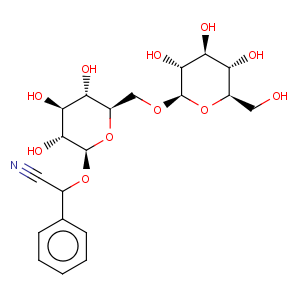Title: Amygdalin
CAS Registry Number: 29883-15-6
CAS Name: [(6-
O-b-D-Glucopyranosyl-b-D-glucopyranosyl)oxy]benzeneacetonitrile
Synonyms: amygdaloside; mandelonitrile-b-gentiobioside; D-mandelonitrile-b-D-glucosido-6-b-D-glucoside
Manufacturers' Codes: NSC-15780
Molecular Formula: C20H27NO11
Molecular Weight: 457.43
Percent Composition: C 52.51%, H 5.95%, N 3.06%, O 38.47%
Literature References: The name amygdalin is currently used interchangeably with
laetrile. Cyanogenic glycoside which occurs in seeds of
Rosaceae; principally in bitter almonds; also in peaches and apricots. Most common constituent of
Laetrile? preparations. Structure and synthesis: W. N. Haworth, B. Wylam,
J. Chem. Soc. 123, 3120 (1923); Kuhn,
Ber. 56, 857 (1923); R. Campbell, W. N. Haworth,
J. Chem. Soc. 125, 1337 (1924); Hudson,
J. Am. Chem. Soc. 46, 483 (1924); Zemplén, Kunz,
Ber. 57, 1357 (1924); Kuhn, Sobotka,
ibid. 1767; Baumann, Pigman,
The Carbohydrates, W. Pigman, Ed. (Academic Press, New York, 1957) p 550. Enzymic hydrolysis studies: Haisman, Knight,
Biochem. J. 103, 528 (1967). The term Laetrile? has also been applied to
mandelonitrile b-glucuronide. Purported prepn: E. T. Krebs, E. T. Krebs, Jr.,
GB 788855 (1958) and
US 2985664 (1961). Synthesis, characterization and comparison of mandelonitrile b-glucuronide with amygdalin: C. Fenselau
et al., Science 198, 625 (1977). Pharmacology and cyanide toxicity studies of amygdalin (laetrile): C. G. Moertel
et al., J. Am. Med. Assoc. 245, 591 (1981); M. M. Ames
et al., Cancer Chemother. Pharmacol. 6, 51 (1981). Pharmacokinetics: A. G. Rauws
et al., Arch. Toxicol. 49, 311 (1982). Determn methods in tissues and fluids: J. Balkon,
J. Anal. Toxicol. 6, 244 (1982). Amygdalin (laetrile) is a toxic drug that is not effective as a cancer treatment: C. G. Moertel
et al., N. Engl. J. Med. 306, 201 (1982). Review of the controversial use of amygdalin (laetrile): V. Herbert,
Am. J. Clin. Nutr. 32, 1121-1158 (1979).
Derivative Type: Trihydrate
Properties: Orthorhombic columns from water, mp 200°; mp about 220° when anhydr. The once melted and solidif substance remelts at 125-130°. [a]D20 -42° (anhydr basis). One gram dissolves in 12 ml water, in 900 ml alcohol, in 11 ml boiling alcohol. Very sol in boiling water; almost insol in ether. pH of satd aq soln ~7.
Melting point: mp 200°; mp about 220° when anhydr; remelts at 125-130°
Optical Rotation: [a]D20 -42° (anhydr basis)
NOTE: The misleading term
vitamin B17, has sometimes been applied to amygdalin.

